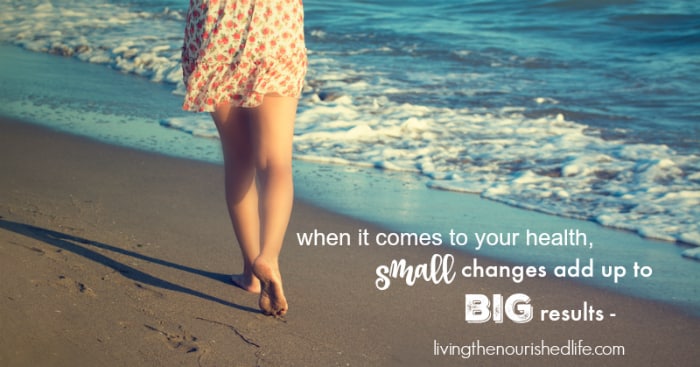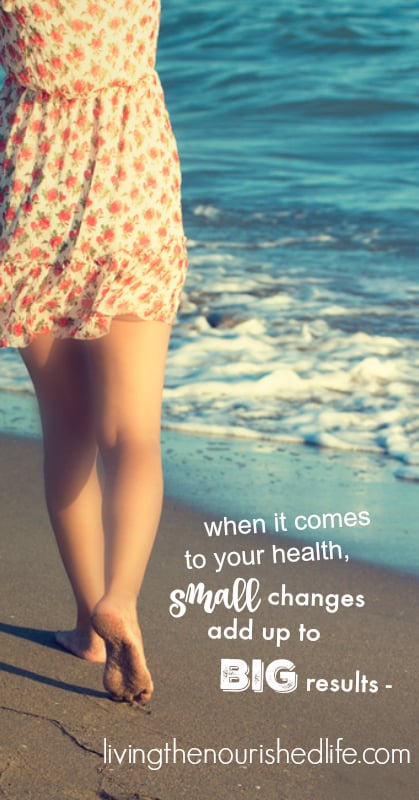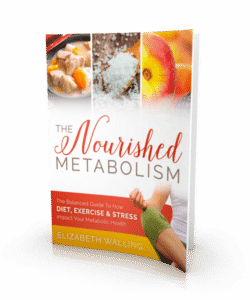I bet you’ve heard that you should think big. Well, not today. I want you to think small. Like really small.
But I want you to think small about one specific thing: healthy changes.
One of the biggest problems I see is this: people tend to think in black and white when it comes to better health. All or nothing. Go big or go home.
You get the idea.
Well, throw all that in the proverbial garbage can.
You see, I have a different idea about what it really takes to be healthy.
Here’s the thing:
I don’t just want you to feel awesome in 30 days. I want you to feel awesome in 5 years… in 10 years… in 20 years. That’s my goal for you.
This is about the rest of your life — not just a few weeks or months.
When you realize that your health is about the rest of your life, going on a two week diet starts to seem silly, doesn’t it?
Let me tell a story about someone… let’s call her Carla.
Carla is in debt. She knows she has bad habits. She spends too much, she doesn’t save, and she doesn’t track where her money is going. At the end of the month, her credit card balances just keep growing.
So she decides to change EVERYTHING for 30 days.
She meticulously tracks every cent she spends, lives on Ramen noodles, doesn’t buy anything new, puts off car repairs, and doesn’t go out (not even for drinks on her best friend’s birthday).
At the end of the month, she pays off $800 in credit card debt and for once gets the satisfaction of seeing her balance go down, not up.
That’s a good thing, right?
Well, it depends on how you look at it. Sure, Carla paid off some debt. But is anything she did really sustainable? Maybe, but not much.
First of all, she feels pretty sick of Ramen noodles. And the car definitely needs to be repaired. She’s also feeling isolated because she’s not spending much time with friends.
So after 30 days, Carla slowly eases back into her old habits and keeps going further into debt.
Every year or so, she panics when one card hits its limit, and goes back to 30 days of insane restriction. And it works… for a little while. Then it’s right back to the same place.
Do you think Carla ever becomes financially free?
Of course not. Financial freedom is about consistent habits. It’s not about what you do for 30 days. It’s about the little things you do every day over a long period of time — and especially the little habits that you never even think about.
It’s the same for your health.
If you want to be healthy, forget doing another 30-day boot camp or 21-day detox.
Remember: this is about the rest of your life.
Instead, focus on developing a few small habits that work for you.
You do those little things every day that make a difference – you stay consistent.
If circumstances change in your life, you work with those changes and adapt. You’re flexible with yourself, because you know that every day isn’t going to be the same. Some days eating well is easy to do, some days it’s really difficult. Sometimes you’re going to get 8 hours of sleep every night without trying too hard. Sometimes it won’t be easy – maybe you had to start working a different shift at work, or you just had a new baby.
Small changes work because you can put them on autopilot – they become habits that you don’t even think about.
When you’re automatically making healthy choices, you are going to feel healthier, and happier and a whole lot less stressed out.
My Top 5 Super Easy Changes for Better Health
Before I talk about some small, easy changes you can make for better health, keep in mind you don’t have to make all them all at once. In fact, I recommend only making one at a time.
Try this:
Make the easiest change for you, or pick the one you know will make the most difference — whatever works for you. Then, once that becomes an automatic habit (give it a few weeks at least), work on another one. You’ll find each subsequent change is a little easier to make.
Why?
Because you’re starting a positive snowball effect. Once you gain a little momentum, it’s easier to keep going!
Now here are five ideas for small, healthy changes you can make:
SMALL CHANGE #1: Eat enough protein.
Protein is a really important nutrient and I put emphasis on it because it seems to be the one people have a hard time getting enough of — especially the right proteins.
Why is protein important?
Protein is made of amino acids, which our bodies use to nourish and rebuild our muscles and bones. And amino acids also play an important role in mental health – because your body actually uses amino acids to build brain chemicals like dopamine. These are the brain chemicals that make you feel awesome and vibrant and have a positive outlook on life. (Read more about this in The Mood Cure.)
So obviously, you want to make sure your body is getting the protein it needs!
(Now, “enough” protein obviously varies a lot between individuals. Read about my thoughts on how much protein you need HERE.)
I want to talk about an amino acid we often don’t get enough of in our modern diets: glycine. Which leads me to my favorite protein – gelatin! (And its close cousin, collagen. This is my favorite brand of collagen to use.)
Gelatin and collagen are rich in glycine, which you don’t find a lot of in other proteins that we normally eat like dairy or meats.
Now glycine is what I call the anti-stress protein – because it has a calming effect on the body. Not just the brain, but the whole body and especially the digestive system. Glycine has some really remarkable anti-inflammatory benefits.
High stress and chronically high stress hormones like cortisol can cause inflammation in the body. So gelatin is a great source of protein that also counteracts the effects of stress in the body.
SMALL CHANGE #2: Don’t skip meals.
Since we’re talking about stress hormones being the enemy of your health – that brings me to my next small change:
No skipping meals!
When you skip meals or go too long without eating, your body automatically releases stress hormones like adrenaline and cortisol.
Have you heard of the term “HANGRY” before?
It’s when you’re so hungry you get irritated easily and lash out at people. You’re hungry and angry – or hangry.
This happens because your stress hormones are high! I used to be so snappy when I was dieting all the time. I was always trying to delay eating — drinking coffee, chewing gum, anything to keep me from eating. I was not fun to be around (ask the kids).
You want to temper those stress hormones by refueling when your body needs it.
Now, you don’t have to worry about eating all the time.
You can find the right balance of meals that works for you. For some people that’s three square meals a day – for others it might be six smaller meals. Or somewhere in between. There’s no “best” answer for everyone.
The point is not to force your body to go too long without food. If you’re obviously hungry, then eat! Even if it’s just a snack of fruit and cheese to tide you over till dinner.
SMALL CHANGE #3: Put one meal a day on “autopilot”
I think putting things on autopilot will get results more than anything else. Because when you’ve really made a habit of something – you do it without thinking. That’s why I call it autopilot.
The best thing? You feel like you get results without working too hard.
That’s why I like to put one meal a day on autopilot. Just one.
I don’t promote being too crazy and rigid with your diet. You want to be fluid and flexible so your diet fits with your life. But sometimes having that one good meal – it’s like your best friend who has your back. It’s your lifeline.
For me that’s my breakfast. Because I just hate cooking in the morning (please say I’m not the only one?).
And when you start your morning off right, it just makes the whole day feel a little bit better, right?
My solution was my coffee smoothie. I just do some coffee, gelatin, real maple syrup, a raw egg and a little coconut oil. It’s high in protein and gives me a big dose of those anti-stress proteins like we were just talking about. It’s a nice balance of fats, proteins and carbs – I always recommend eating some of each at every meal in my book The Nourished Metabolism.
You can get the exact recipe for my coffee smoothie with some tips for making it (and some options for substitutes) HERE.
I don’t even think about it anymore. I never walk into the kitchen in the morning and wonder, “What am I eating for breakfast?”
So that’s autopilot for me. It’s a habit I do every day without worrying about it.
I want to encourage you to pick a specific meal to put on autopilot. It might be breakfast or lunch. Or some people do really well doing meal plans for dinner – that’s the meal where you might be tired after working all day and end up eating out. If you have dinner planned every night, it can be easier to automatically make healthier choices.
Just start with one meal and make a healthy habit you don’t even have to worry about. It really will make eating well feel so much easier.
SMALL CHANGE #4: Start a bedtime routine.
Sleep is such an important part of having a nourished metabolism.
Healthy sleep patterns keep stress hormones at normal levels and even helps maintain healthy blood sugar levels – whereas sleep deprivation does the exact opposite.
We all should be getting 7-9 hours of sleep every night if we can. Most of us know this, but sometimes it’s still hard to actually do!
Almost everyone I talk to has the same problem – they have trouble winding down at the end of the night and actually getting to sleep.
Is that you?
And when I ask what they’re doing before bed, they’re telling me stuff like answering Facebook messages… or finishing up a project for work… or doing the last load of laundry… or watching an exciting TV show with a lot of action and suspense (I’m talking to all you Walking Dead fans out there!).
These are things we all get caught up doing (even me), but it’s also not something that’s helping us get to sleep.
A lot of us are on a time crunch and we have to get stuff done, but the hour before you’re supposed to be sleeping is NOT the time for that.
So an hour before bed, I want you to put away your to-do list and save it for tomorrow.
And for the love of peaceful sleep, DO NOT work in your bedroom.
Have a designated place where you handle work stuff.
Maybe you don’t have an office at your house, but if you have to choose a place to get work done at home, don’t make it your bed – especially right before bedtime.
Don’t drink coffee or have any kind of caffeine intake at least 3-4 hours before you need to be sleeping.
If you’re really sensitive to caffeine you might need to cut it out for 6-12 hours before it’s time to sleep. I know it’s really tempting when you have stuff to get done to swig a cup of coffee to keep you energized, but it’s just going to keep you up all night, and start that cycle of feeling exhausted the next day and needing more caffeine.
You’ve got to stop that cycle somewhere.
One thing that really helped me was having a list of ideas of things to do in that hour of bedtime, so I felt like I had some options that were actually relaxing instead of stuff that would keep me awake.
Stuff like:
- taking a relaxing bath
- having a cup of herbal tea (try chamomile)
- reading a good book
- free writing in my journal (learn about free writing benefits here)
- having some fun with an adult coloring book
- maybe watching something more relaxing on TV, like a documentary – something that’s entertaining but not way too exciting
Don’t overdo the exercise.
For some people, exercising too much in the evening can raise stress hormones enough to make it hard to relax enough to fall asleep.
So make sure your exercise isn’t too close to your bedtime. Walking, especially outside, is usually great. Getting that fresh air and moving just a little before bed can really help you fall asleep later.
And don’t go to bed hungry.
Again, hunger increases stress hormones, which is going to keep you awake. Have some kind of balanced snack before bed, something with a little protein, fats, and carbs. I like to have a little gelatin in some homemade cocoa some nights, it’s warm and relaxing and that gelatin is really calming right before bed.
Now if you need some extra help falling asleep, try some herbal remedies like valerian root or lemon balm.
Essential oils are also awesome! I use them all the time. I have an essential oil diffuser in my bedroom and I diffuse lavender, cedarwood, chamomile and orange oil before bed to promote relaxation. Learn more about the essential oils I use in my free eCourse here.
SMALL CHANGE #5: Move your body.
The funny thing is that as much as we’re a society obsessed with exercise, when it comes to our health, moving our bodies – not necessarily exercise – is what makes the real difference.
People who are active and move their bodies are healthier than people who do what we think of as “exercise” (like going to the gym a few times a week) and then spending the rest of their time sitting down.
Now, as someone who works at the computer, I can really get caught up sitting a lot during my day. So when I started to read this research – that people who sit all the time are more at risk for heart disease, blood sugar issues, and even dying earlier – I realized I needed to get moving!
I want you to find a way of moving your body that fits into your life, that works for where you are right now, and fits with your personality.
We moved last year and where we live now has a lot of amazing places to bike, so that’s something we do a lot more of now. It’s really fun! I never think about it as “exercise” – it’s just fun (even a little relaxing), and it’s moving my body.
So find things to do that are fun or relaxing but involve being at least a little active.
It might be taking walks, or doing some stretching before bed, or just getting up from the desk and doing some push ups and jumping jacks to get your blood flowing. Play hide and seek with your kids in the backyard – or even ping pong!
If it gets you moving, it counts.
Another thing that’s been really big for me is getting a pedometer. You can read about my experience with my Fitbit HERE.
These little things add up. It all comes back to small, easy changes. Don’t be afraid to start small — it might be just the thing you need to make lasting positive changes in your life.
Like this post? Pin it below to share:
Want to read more? 
Tired of spinning your wheels trying to get healthy? Forget the extreme approach and try the balanced approach to forming healthy habits that nourish your body instead.
I wrote The Nourished Metabolism because I spent too many years confused by all the different gurus, hopping from bandwagon to bandwagon trying to find the “right” way, instead of just listening to my intuition and my body.
If you’re looking for a simple, common-sense approach to healing your metabolism, I really think you’ll enjoy this book.
Click here to learn more about my book…



